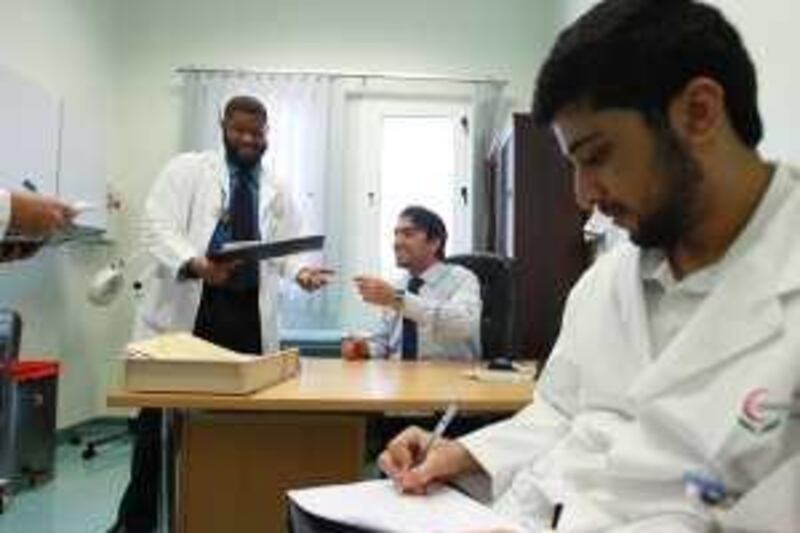AL AIN // A national shortage of male Emirati doctors has led the medical faculty dean at UAE University to call on health authorities to support students through scholarship programmes. Ten years ago, about 65 per cent of students at the country's leading medical school were male. Now it is just 38 per cent, said Dr Mohammed Yousif Baniyas, the dean of the faculty of medicine and health sciences.
"Medicine is a long journey," he said. "It's challenging and rewarding but it's long: at least 14 years. "Just doing medicine is not enough. You have to specialise and then for the first five years you will be a trainee." The struggle to recruit Emirati males, he said, is made more difficult by the lack of financial support for the students. If they were training in fields like engineering, they would receive a monthly stipend and more guarantees of work upon graduation.
"Business students who've studied for four years will graduate and earn the same money as a medical student who's been studying for 13 or 14 years," Dr Baniyas said. The military and the police are luring male students with attractive salary packages and shorter periods of study, he said. Dr Hassan Galadari, 31, a graduate of UAE University and an assistant professor of dermatology, said students need a passion for medicine. Despite the profession's continued prestige, he said, it is not a source of big salaries.
"A lot of Emiratis, especially from the northern emirates, are expected to provide for the family, so they need to study something that's quicker," he said. "And unless they are sponsored, it is not attractive to go into medicine." Exact figures are not available, but it is estimated that fewer than 10 per cent of doctors in the Emirates are nationals. Wages can be as low as Dh11,000 (US$3,000) a month for newly qualified doctors. Many tend to go directly into administration, with a quicker career path, fewer hours, no patient responsibility and higher wages, Dr Baniyas said.
"There is no on-call, no overtime like you have when you're a doctor," said Dr Galadari, who also works at Tawam Hospital. Female medical students face an added cultural hurdle, he said, because they may still be expected to take care of the home and family, "which is why we need more male doctors". Dr Hatem al Ameri, from the Health Authority-Abu Dhabi, said another deterrent to entering the medical field for male Emiratis is that many of the qualified physicians are not put into leadership roles. "These doctors must be the backbone of the health system," he said. "It's not just about increasing the numbers but putting those we have into leadership positions."
The key to enticing more men, said Dr Baniyas, is to improve the school's postgraduate capacity to develop more specialists without the need to send them abroad. "The most crucial thing for the next decade is to open up opportunities for the students," he said. "Postgraduate education has to be better co-ordinated. There is no Emirati board or umbrella in the UAE that accredits, runs or endorses postgraduate training."
Dr Ali al Numairy, the president of the Emirates Medical Association, said Emirati doctors were vital to the country's future. "Our medical profession should be well-fortified with Emiratis," he said. "I'm not saying there should be no expatriates; we of course learn by working side-by-side. But the skeleton should be made up of Emiratis. How can a society depend on expatriates? We had an example when Kuwait was invaded by Iraq. The national will always give with all their will but the expatriate can leave."
@Email:mswan@thenational.ae





